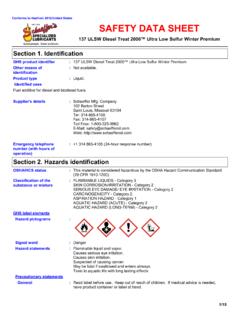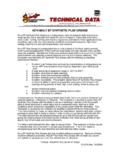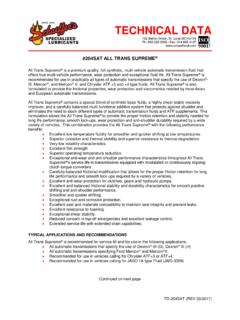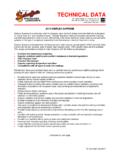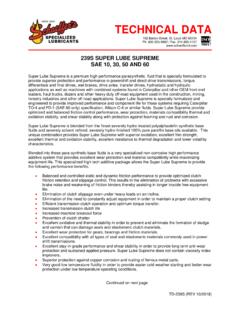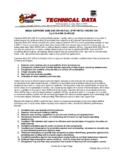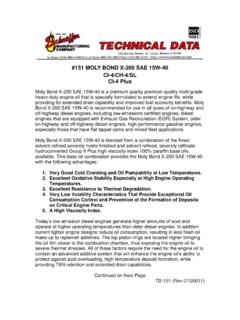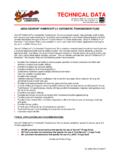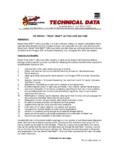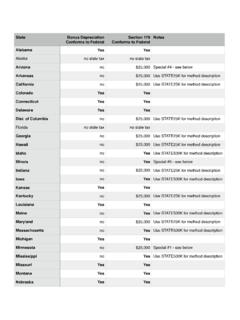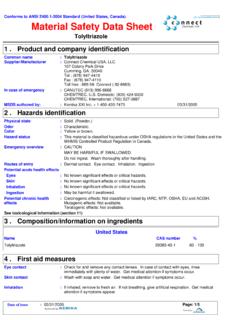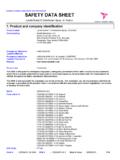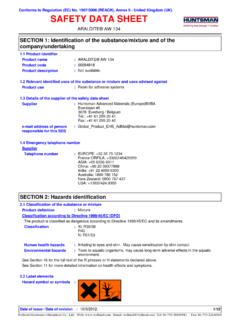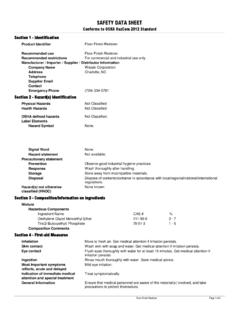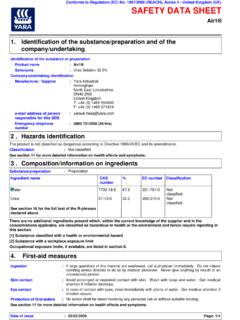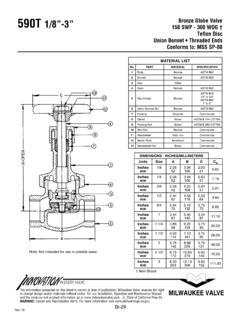Transcription of Conforms to HazCom 2012/United States SAFETY …
1 254 HTC Supreme ISO 22, 32, 46,68, 100,150, 220 and 320 Not product identifierOther means of identificationProduct typeEmergency telephone number (with hours of operation)Section 1. Identification::::Supplier's details:Identified uses254 HTC Supreme ISO 22, 32, 46,68, 100,150, 220 and 320 SAFETY DATA SHEETC onforms to HazCom 2012/United StatesPara-synthetic base hydraulic fluid and air compressor oil.+1 314 865-4105 (24-hour response number)Schaeffer Mfg. Company102 Barton StreetSaint Louis, Missouri 63104 Tel: 314-865-4100 Fax: 314-865-4107 Toll Free: 1-800-325-9962E-Mail: 2. Hazards identificationNot of the substance or mixture:Signal word:No signal statements:No known significant effects or critical statementsPrevention:Not :Not :Not :Not label elementsOSHA/HCS status:While this material is not considered hazardous by the OSHA Hazard Communication Standard (29 CFR ), this SDS contains valuable information critical to the safe handling and proper use of the product.
2 This SDS should be retained and available for employees and other users of this not otherwise classified:None 254 HTC Supreme ISO 22, 32, 46,68, 100,150, 220 and 320 Section 3. Composition/information on ingredientsBase Oil(s)(*)60 - 100 See , homopolymer, hydrogenated30 - 6068037-01-42, - 1128-39-2 Ingredient nameCAS number%There are no additional ingredients present which, within the current knowledge of the supplier and in the concentrations applicable, are classified as hazardous to health or the environment and hence require reporting in this :Occupational exposure limits, if available, are listed in Section concentration shown as a range is to protect confidentiality or is due to batch oil(s) contained in this material may be described by one or more of the following CAS Nos.
3 : 64742-01-4, 64742-54-7, 64742-57-0,64742-62-7, 64742-65-0, 72623-85-9, out mouth with water. Remove victim to fresh air and keep at rest in a position comfortable for breathing. If material has been swallowed and the exposed person is conscious, give small quantities of water to drink. Do not induce vomiting unless directed to do so by medical personnel. Get medical attention if symptoms flush eyes with plenty of water, occasionally lifting the upper and lower eyelids. Check for and remove any contact lenses. Get medical attention if irritation contaminated skin with plenty of water. Get medical attention if symptoms victim to fresh air and keep at rest in a position comfortable for breathing. Get medical attention if symptoms 4.
4 First aid measuresEye contactSkin contactInhalationIngestion::::Protection of first-aiders:No action shall be taken involving any personal risk or without suitable to physician:Treat symptomatically. Contact poison treatment specialist immediately if large quantities have been ingested or of necessary first aid measuresSpecific treatments:No specific important symptoms/effects, acute and delayedInhalation:No known significant effects or critical known significant effects or critical hazards.:IngestionSkin contact:No known significant effects or critical known significant effects or critical hazards.:Eye contactOver-exposure signs/symptomsSkin contactIngestionInhalationNo known significant effects or critical known significant effects or critical known significant effects or critical hazards.
5 :::Eye contact:No known significant effects or critical acute health effectsSee toxicological information (Section 11)Indication of immediate medical attention and special treatment needed, if necessary2/10 254 HTC Supreme ISO 22, 32, 46,68, 100,150, 220 and 320 Section 5. Fire-fighting measuresNo special measures are thermal decomposition productsSpecific hazards arising from the chemicalNo specific specific fire or explosion should wear appropriate protective equipment and self-contained breathing apparatus (SCBA) with a full face-piece operated in positive pressure protective equipment for fire-fightersUse an extinguishing agent suitable for the surrounding media:::None extinguishing media:Unsuitable extinguishing media:Special protective actions for fire-fighters:Section 6.
6 Accidental release measuresEnvironmental precautionsPersonal precautions, protective equipment and emergency procedures::No action shall be taken involving any personal risk or without suitable training. Keep unnecessary and unprotected personnel from entering. Do not touch or walk through spilled material. Put on appropriate personal protective dispersal of spilled material and runoff and contact with soil, waterways, drains and sewers. regulations may require reporting spills of this material that could reach any surface waters. Report spills to all applicable Federal, State, Provincial and local authorities and/or the United States National Response Center at (800) 424-8802 as appropriate or and materials for containment and cleaning upFor non-emergency personnelFor emergency responders:If specialized clothing is required to deal with the spillage, take note of any information in Section 8 on suitable and unsuitable materials.
7 See also the information in "For non-emergency personnel".Small spillStop leak if without risk. Move containers from spill area. Approach release from upwind. Prevent entry into sewers, water courses, basements or confined and collect spillage with non-combustible, absorbent material sand, earth,vermiculite or diatomaceous earth and place in container for disposal according to local regulations (see Section 13). Dispose of via a licensed waste disposal absorbent material may pose the same hazard as the spilled : see Section 1 for emergency contact information and Section 13 for waste spill:Stop leak if without risk. Move containers from spill area. Absorb with an inert dry material and place in an appropriate waste disposal container.
8 Dispose of via a licensed waste disposal contractor.:Section 7. Handling and storageAdvice on general occupational hygieneEating, drinking and smoking should be prohibited in areas where this material is handled, stored and processed. Workers should wash hands and face before eating,drinking and smoking. See also Section 8 for additional information on hygiene measures.:Protective measuresPut on appropriate personal protective equipment (see Section 8).:Precautions for safe handling3/10 254 HTC Supreme ISO 22, 32, 46,68, 100,150, 220 and 320 Section 7. Handling and storageConditions for safe storage,including any incompatibilitiesStore in accordance with local regulations. Store in original container protected from direct sunlight in a dry, cool and well-ventilated area, away from incompatible materials (see Section 10) and food and drink.
9 Keep container tightly closed and sealed until ready for use. Containers that have been opened must be carefully resealed and kept upright to prevent leakage. Do not store in unlabeled containers. Use appropriate containment to avoid environmental contamination.:Base Oil(s)(*)NIOSH REL (United States , 10/2013). TWA: 5 mg/m 10 hours. Form: Mist STEL: 10 mg/m 15 minutes. Form: MistACGIH TLV (United States ). TWA: 5 mg/m Form: Oil mist. STEL: 10 mg/m Form: Oil PEL (United States ). TWA: 5 mg/m Form: Oil 8. Exposure controls/personal protectionIngredient nameExposure limitsHand protectionIf a risk assessment indicates that respiratory protection is required, use a properly fitted,air-purifying or supplied air respirator that complies with an approved selection must be based on known or anticipated exposure levels, the hazards of the product and the safe working limits of the selected nitrile or oil resistant eye protection such as SAFETY glasses, chemical goggles, or face shields if engineering controls or work practices are not adequate to prevent eye protectionRespiratory protection.
10 Body protectionPersonal protective clothing such as gloves, aprons, boots and complete facial protection should be selected based on the task being performed and the risks should determine acceptable performance characteristics of protective physical requirements and other substances present when selecting protective clothing.:Environmental exposure controls:Emissions from ventilation or work process equipment should be checked to ensure they comply with the requirements of environmental protection engineering controls:Good general ventilation should be sufficient to control worker exposure to airborne hands, forearms and face thoroughly after handling chemical products, before eating, smoking and using the lavatory and at the end of the working techniques should be used to remove potentially contaminated contaminated clothing before reusing.
